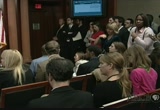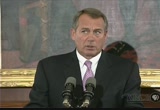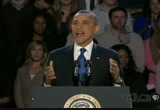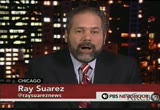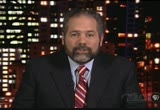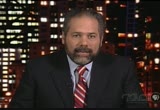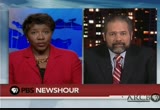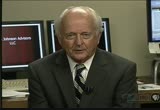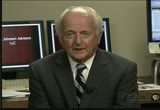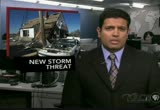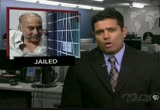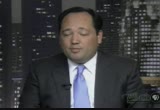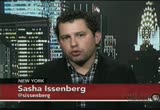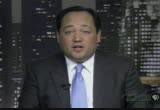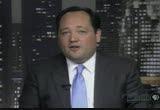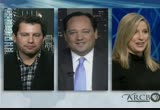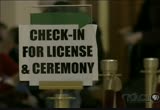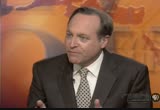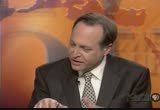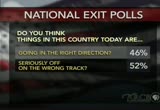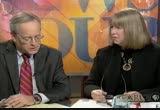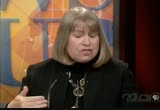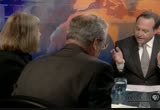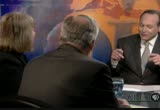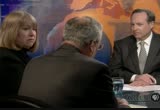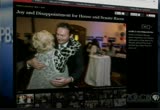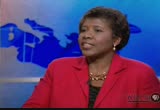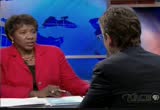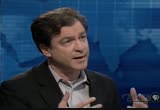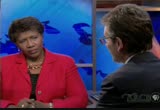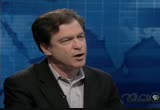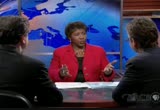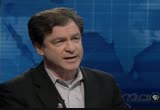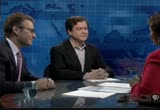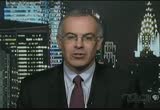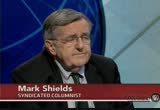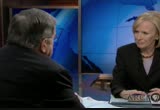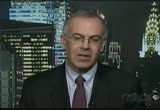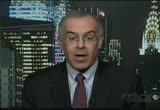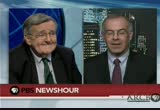tv PBS News Hour PBS November 7, 2012 10:00pm-11:00pm PST
10:00 pm
captioning sponsored by macneil/lehrer productions >> woodruff: president obama returned to washington today after winning the electoral college, the popular vote and a second term. good evening, i'm judy woodruff. >> ifill: and i'm gwen ifill. on the "newshour" tonight, kwame holman wraps up the results and the reaction and ray suarez reports from chicago on the president's day. >> woodruff: we assess the tactics that led to success for the obama campaign and failure for mitt romney. >> ifill: we examine the messages voters sent yesterday with jeffrey brown, who looks at the makeup of congress and the new laws around the country.
10:01 pm
>> woodruff: what to do about the fiscal cliff, healthcare and immigration? we explore the challenges ahead in the next four years. >> ifill: and back with us again, for analysis, are mark shields and david brooks. >> woodruff: that's all ahead on tonight's "newshour." major funding for the pbs newshour has been provided by: ♪ ♪
10:02 pm
moving our economy for 160 years. bnsf, the engine that connects us. and with the ongoing support of these institutions and foundations. and... this program was made possible by the corporation for public broadcasting. d bcontbutns to your pbs station from viewers like you. thank you. >> woodruff: for the first time
10:03 pm
in four years, president obama did not have to worry about re-election today. still, there was little time to savor tuesday's victory, in the face of a potential fiscal crisis at the end of the year. "newshour" correspondent kwame holman begins our coverage on this day after the election of 2012. >> reporter: mr. obama departed his hometown of chicago this afternoon for washington, his home for another four years. waiting for him: a still- divided congress now facing a critical lame duck session. the president made it clear in his victory speech last night that he thinks the country wants an end to gridlock. >> tonight, you voted for action, not politics as usual. ( applause ) you elected us to focus on your jobs, not ours. and in the coming weeks and months, i am looking forward to reaching out and working with leaders of both parties to meet the challenges we can only solve together: reducing our deficit;
10:04 pm
reforming our tax code; fixing our immigration system; freeing ourselves from foreign oil. we've got more work to do. ( applause ) >> reporter: the most immediate challenge: avoiding the so- called "fiscal cliff" that looms in january, including expiration of the bush-era tax cuts, plus more than $1 trillion in automatic spending cuts. the senate's democratic majority leader harry reid said voters agreed with the president on raising taxes for wealthier americans. >> the president campaigned around the country saying we know what the problems are with this fiscal problem, we just need some revenue. that was the issue. the mandate was, look at all the exit polls, look at all the polling-- the vast majority of the american people, rich, poor, everybody agrees that the richest of the rich have to help a little bit. >> reporter: republican leaders saw it differently.
10:05 pm
republican leaders-- led by house speaker john boehner-- suggested a deal was possible, and invited the president to make a proposal. said boehner, "this is your moment. we want you to lead." >> we're willing to accept new revenue under the right conditions. what matters is where the increased revenue comes from and what type of reform comes with it. does the increased revenue come from what the government taking a larger share of what the american people earn through higher tax rates? or does it come from a byproduct of growing our economy energized by a simpler cleaner fairer tax code with fewer loopholes and lower rates for all. >> reporter: it all signaled a quick return to earth, after the jubilation of election night that swept up even chicago mayor rahm emanuel, during a live interview with the "newshour's" ray suarez. the president built his victory over mitt romney on a series of wins in battleground states, giving him 303 electoral votes-- 33 more than needed.
10:06 pm
he also was running ahead in florida, for another 29 electoral votes, but the state had not yet been called after long lines on tuesday held up the count. the president built his victory over mitt romney on a series of wins in battleground states, for 332 electoral votes-- 62 more than needed. that total included florida's 29 electoral votes, which were romney won white voters, but their share of the electorate was down slightly from 2008. mr. obama overwhelmingly captured black and latino voters. last night, he sought to appeal to both sides of the political divide. >> whether i earned your vote or not, i have listened to you. i have learned from you. and you've made me a better president. with your stories and your struggles, i return to the white house more determined and more inspired than ever about the work there is to do, and the future that lies ahead. ( applause ) >> reporter: as a first step, the president telephoned congressional leaders today to
10:07 pm
talk about priorities for the rest of the year. he also said he hopes to talk to romney in the days ahead on how to move forward. >> ifill: ray suarez reported for us from obama election headquarters last night. he joins us from chicago now. hi ray. tell us what did the president-elect and the president-- same person, do today? how it he spend his day? >> suarez: he got to spend the night in his own home in chicago. when he got up this morning, he headed over to obama for america headquarters on chicago's lakefront and thanked his volunteers who had worked for him over the past year-plus. it was said to be a very moving and very emotional encounter between the president and the people who haveade re that he's going to be president for another four years. as kwame mentioned, he's spoken with all the leaders of the two branches of the legislature, and put on the agenda tax cuts for
10:08 pm
the middle class and small businesses, job creation, and says that the message from last night's election is that the people want them to put aside their partisan differences to work for the better interests of the american people. >> ifill: now, all those people at obama for america headquarters who have been working probably nonstop since 2008 to set up the infrastructure for this victory last night. how do they think-- what do they think won the election for them? >> suarez: they put together very carefully a coalition over time, and tonight david axelrod is saying it's very gratifying that that coalition came together, as kwame mentioned-- blacks, latinos, women, a very broad gender gap, and also youth of all origins. the 18-29 vote was expected not to come out, and the campaign insisted all along it would. and they were closer to the uth an tose people who said the '08 coalition couldn't be reassembled again.
10:09 pm
david axelrod also said in the key battleground state of ohio, he thought it was a big mistake for governor mitt romney to try to relitigate, in his words, the auto bailout which turned out to be a big negative for him. >> ifill: overall, does mr. axelrod or anyone say that this victory, this margin of victory was more or less than they expected in the end? >> suarez: well, they've all sai tha it tned out pretty much the way that they had expected it would. and earlier in the campaign season, when you talked about specific states-- in fact, when you got down to specifics-- it pretty much-- the map pretty much looks today the way they said it would in recent weeks. one standout was the latino vote, which for this election cycle, broke double digits of the overall electorate for the first time. the national latino coordinate for the d.n.c.positive juan
10:10 pm
sepulva, told me earlier today, there was a record-- even though there were a lot of things working against a big latino turnout, they started 700,000 registrations down after the great recession because so many people had lost their homes, lost their jobs, moved, and not reregistered in the new communities where they were living. but the latino turnout, according to juan sepulveda, may have given them the margin of victory in colorado, nevada, and virginia glaen glen when the latino voters turned out, 71% of them voted for the president. ray sarez, thank yor all your good work from chicago. >> suarez: thanks a lot, gwen. >> woodruff: we'll devote much of the rest of the program to the events of last night and the coming days including what worked and what didn't; what the voters endorsed what's ahead in the president's second term. plus, shields and brooks. but first, the other news of the day. here's hari sreenivasan. >> sreenivasan: wall street had its worst day of the year, amid worries about continuing divided government in washington and bad news out of europe.
10:11 pm
the dow jones industrial average lost nearly 313 points to close at 12,932. the nasdaq fell 74 points to close at 2,937. for more on what happened, i spoke earlier with economist hugh johnson, who runs his own investment services company in albany, new york. so, mr. johnson, tell me, how do we distribute the weight of what's pull the market down? is it the fears in europe? is it the fears about the fiscal cliff? >> it's hard to tell which is more important. they're both very important, and, you know, today sort of dramatized both. the european union formally reduced its forecast for what's going to happen to te eupean union, their economy, in 2013, and they reduced it very, very sharply. that's very bad news. it's particularly bad news for any u.s. company that's doing business with europe or sell things to europe. obviously, their revenues and their earnings are going to suffer from that. so that's a big part of it.
10:12 pm
and the other part of it is the concerns, the ongoing concerns about the fiscal cliff, meaning the automatic increase in taxes and spending cuts that are going to occur at the federal government lefat t endf this ye, unless something is done about it. and the belief is that, you know, with things being sort of unchanged in washington, obama winning, the republicans still controlling the house of representatives, the democrats controlling the senate, that it's business as usual and that we'll have trouble avoiding that fiscal cliff at the end of the year. that might mean bad things for the u.s. economy. so i think those are both very significant concerns, and weighed on investors today ask they obviously responded by selling stocks. >> sreenivasan: we heard late toy grepsass its austerity measures through its parliament. is that likely to give the markets a bounce? >> yeah, i think you're going to get a bounce and i think that will help give it a little bit of a bounce.
10:13 pm
i'm a little surprised at the austerity measures. there are a lot of unsettled people in greece. the economy of greece is clearly suffering from the austerity measures that have been imposed on greece, an economy that's in a recession. i think those same kind of concern are about the u.s. imposing fiscal restraint in the form of higher taxes and less spending on our ecomy. but i think you'll get a little bit of a bounce tomorrow, yes ?rawr all right, health care thanks for your time. a new storm threatened the northeast today with wind, water and snow. its arrival came just over a week after hurricane sandy battered the region. police cars in new york city patrolled low-lying neighborhoods, urging people to evacuate again. the approaching nor'easter brought a wintry mix of cold and snow and possibly, minor flooding in already damaged coastal areas. new york mayor michael bloomberg: >> we haven't and won't order the kind of large scale evacuation we ordered in advance of hurricane sandy but if you are experiencing significant
10:14 pm
flooding during sandy you should consider taking shelter with friends and family at a safer spot or using one of the city's storm center shelters. >> sreenivasan: in new jersey, thousands of storm-weary people braced for their brush with the new storm, even as cleanup efforts continued from "sandy". governor chris christie suggested it was a little like the biblical plagues. >> when i finally got that final kind of, forecast that i got last night, i said i'm waiting for the locusts and pestilence next, you know. >> sreenivasan: the storm could also bring wind gusts of 65 miles an hour-- bedeviling efforts to restore power to more than 600,000 customers still in the dark in new jersey and new york. >> we may take a setback the next 24 hours. you need to be prepared for that. i'm prepared for that. i hate setbacks. i don't tolerate them usually very well, but this one, i can't control. the weather is what it is, and we're going to have to deal with it. >> sreenivasan: at regional airports, a new round of cancelled notices went up as
10:15 pm
major airles scrapp hundreds of flights into and out of the new york city region. and all construction in the city was halted, after "sandy" left a crane dangling from a manhattan high-rise last week. >> the manned behind the anti-ms. limb film faces of time in federal prison. he was sentenced in violation for violating probation, not related to the film "the innocence of muslims" which portrayed muhammad as a fraud and womanizer. diplomatic efforts to end the civil war in syria entered a new phase today, hours after news of president obama's re-election flashed around the world. british officials announced they will begin dealing directly with syrian rebel leaders, and they urged the u.s. to join them. and turkey confirmed it's in talks with nato allies, including the u.s., to create a safe zone inside syria. one plan would deploy patriot missiles just inside turkey, to protect civilians in the safe zone.
10:16 pm
those are some of the day's major stories. now, back to judy. >> woodruff: the president secured a second term thanks in part to building a massive ground game, coupled with an early investment in negative television ads defining romney. to get a better understanding of how mr. obama did it, and for an inside look at what hindered romney's campaign, we talk with three journalists covering different aspects of the race. they are philip rucker of "the washington post, who has been traveling with romney all year. carol lee of the "wall street journal," who covers the white house. and slate columnist sasha issenberg, author of the book, "the victory lab, the secret science of winning campaigns." now in new york city. carol leigh let me start with you. at what point did the obama campaign, did the obama team begin to think about how they wanted to position themselveses and how did they do it? >> very early. they-- the first step that they took was to determine that they
10:17 pm
were going to run in a terrible economy, and they needed a message that would be sailiable, regardless of what was happening in the economy, so they settled on this notion that they wanted to make the election about a choice, where voters were going to look and decide which candidate was going to stick up for them. and that's why the president hammer on the middle class message. that was an early decision. >> woodruff: even before they knew who their opponent was. >> exactly. their opponent they always assumed was going to be the economy essentially. as time moved on and they figured it was definitely going to be romney they zeroed in on him. and there were a couple of pivotal moments throughout the campaign and one came december of 2011, where a bunch of the president's senior staff met at their campaign headquarters in chicago and had recentlyeen a pew research poll-- study, that showed romney wasn't taking much heat in the primary, and that corporated them and that his opponents weren't really attacking him in ways that they wanted him to be attacked.
10:18 pm
they wanted him to walk out of the primary limping. and so they decided to, as one aide put it, create some turbulence for him. and in order to do that, decided they were going stoog after his record on bain capital. >> woodruff: this is as the primary were still-- >> it was often unventional move for the sitting property and his ides tongage in a republican primary but they threw out some things on bain. they had some former bain employees traveling through iowa touring the primaries in order to get his-- romney's opponents to engage, which they eventually did, as you remember. newt gingrich did and rick perry did. >> woodruff: so they really injected themselves into the primary process. >> exactly. >> woodruff: philip rucker, tell us, first of all, how did the romney folks early on see this campaign? and how did they deal with this move by the obama team, even in the primaries, to come after him? >> yeah, well, from the very beginning when governor romney got tho spo this race he and his
10:19 pm
adviserred decide they wanted this to be a referendum on presidenpresident obama's stewaf the economy and they thought governor romney, given his years of experience in the private sector could present himself as the only republican sort of with the skills and upon-how and experience to turn around the economy and they were just going to hammer that message all year long. and, indeed, they did. but when the bain capital attacks came, the romney campaign was pretty prepared for them. you'll remember back in 1994, in his race against senat ted kennedy, he dealt with a lot of these same attacks over his career at bain capital, over the layoffs and closure of a lot of factories that bain was investing in, so the romney campaign was prepared for those attacks but they did not expect they would happen in the context of the republican primary. they thought this would wait until the general election. and when newt geng rich and rick perry brought it up in january of 2012, the rom no campaign pretty effectively deflected those attacks. he went on to win the nomination. the attacks didn't seem to
10:20 pm
really stick too much. and what that did was creed sort of a false confidence within the romney brain trust that they had litigated this issue completely and come the general election when the obama campaign really stepped up its attacks on bain capital, that they just wouldn't stick, and of course that was not the case. >> woodruff: at that point, carol leigh, the obama folks just bore down even harder. >> they did. this was a very-- what they describe as one of the most pivotal moments of the campaign came in may when obama campaign manager jim messinna and other top aids nt t thehiteous and had a meeting with the president in the roosevelt room and said we're thinking of spending 20% of our overall campaign budget attacking romney on bain capital and we're not going to let up. we're going to get him at a moment when he's vulnerable. he's coming out of a primary, he's bruised and can't spend his general election money until after the republican convention. >> woodruff: sasha issenberg, i want to bring you into this.
10:21 pm
meanwhile, while all this strategy plan was going on, in terms of a ground game, the big papi information decided very early on they were going to do-- te someing th hadstarted in 2008, and bear down on it. tell us very quickly how that worked. >> this is basic alone an instance of tactic informing strategy. the obama campaign thought of this as a mobilization election. thait they had to put together the coalition from 2008. part of the electorate that traditionally vote at a low rate and reengage them and mobilize them-- young people and minorities, in particular. what they had on their side was a whole bunch of new tools. ty strt running randomized controlled experiments, basically field experiments, that allowed them to understand what actually moved voters. and they came up with a sort of body of knowledge, not only about specific issues that would persuade voters, little bits of messaging, but they came to understand i think a whole lot more about what the value of an
10:22 pm
individual interaction with the volunteer was in both changing somebody's mind or getting them out to vote and that informed their ability to think they could-- even if they were outspent in the fall-- to do a lot of this work on the ground. >> woodruff: so they really took the whole idea of identy the ve d get out the vote to a whole new level. >> yeah, and understanding what actually moves people. there are been strides in 2004 how you segment the electorate, how you understand where your targets are but people still didn't know what happened when you interacted with them and who you should be trying to persuade, who you should be trying to mobilize and at what time. and the obama operation, by using experiments got a whole new franchise on understanding the best way to allocate resources and what you can use volunteers to do that you don't have to spend your tv money on. >> woodruff: meanwhe, plip rucke from the romney camp's perspective, they didn't lock down the nomination until the spring of this year. by that time, that whole ground effort was very far along. how did the romney camp view
10:23 pm
what the obama folks were doing? >> they were, in many respects, in awe of what the obama folk were doing, and they did not have the resources or the mappower or, frankly, the time and energy to devote to trying to catch up. they thought they could lock down this primary nomination by the end of january or early february and what end up happening is they played the sort of extended game of whack-a-mole where a different candidate came up every month and it wasn't until the end of april that they secured the nomination and at that point the romney campaign was pretty much broke. his image was battered by the nominating battle where he lurched to the right on a number of issues and he was in a bad position to take on the obama machine. they began to try to assemble a ground game and started raising money but even up until the end of the election this month, they didn't catch up displood in just a ery littl te we have left, carol leigh what, would you say
10:24 pm
the obama folks said made the difference? the front-end spending that allowed them to soften romney up ahead of going into the republican convention, and they caught some breaks, too. if you remember, romney's 47% tape came right after the moment and underscored-- the argument they were making. >> woodruff: philip rucker, what would the romney people say was mainly responsible for what happened? >> well, they certainly point to the same things carol just talked about. they also think the obama campgn w just really exceptional in turning out voters and kind of identifying supporter in some of these state hike ohio and virginia and florida and in the end they weren't able to match those metrics. but it was really an image problem for governor romney, and all through the summer he was beaten up to the point where there was this foundational, severe image problem he had and he just couldn't recover, even that first debate. >> woodruff: a quick final word from sasha issenberg on how much difference the obama people believe that sophisticate ground
10:25 pm
game made. >> yeah, i mean, we're in an era where our politics are incredibly polarized and i think the challenge for most campaigns are identify and pinpoint people on their side and figure out what it takes to motivate them to vote, turning nonvoters into voters and i think the obama campaign understood early on this had more to do with the outcome of the election than persuading the small number of voters up for grabs. >> woodruff: sasha issenberg, thank you, especially for getting through that storm in new york city. thank you philip rucker, carol leigh. thank you, all three. >> thank you. >> ifillelectiondon't just give ususew elected officials, they also give us lots of information about the country. dante chinni of patchwork nation starts to analyze some of that data on the rundown. >> woodruff: beyond the presidential contest, voters tuesday chose members of congress and senators in a pitched battle for control. jeffrey brown has our story. >> brown: senate democrats had cause to celebrate last night and again today, when the last two races were called.
10:26 pm
montana senator jon tester kept his seat after a tough re- election fight and heidi heitkamp emerged the victor in a close race in north dakota. as a result, democrats will hold 53 seats in the new senate that convenes in january-- a gain of two. republicans will have 45. two seats will be filled by independents, and at least one of them will caucus with democrats. many of the democrats' big wins were by women. elizabeth warren unseated incumbent republican scott brown in massachusetts. >> you took on the powerful wall street banks and special interests and you let them know you want a senator who will be out there fighting for the middle class all of the time. >> brown: in missouri, senator claire mccaskill had been on the endangered list, before her republican opponent made damaging comments about rape and abortion. >> with a stubborn
10:27 pm
determination, tenacity and a refusal to give up we showed the country what missouri is made of. >> brown: and in wisconsin, newly elected democrat tammy baldwin became the first openly lesbian politician to be elected to the senate. >> i didn't runo make history. i ran to make a difference. ( applause ) a difference, a difference in the lives of families struggling to find work and pay the bills. >> brown: on the republican side, tea party forces did manage a victory in texas with ted cruz. >> tonight is a tremendous testament to republican women, to tea party leaders, to business leaders, to community activists, to all of you: this isyourictory. >> brown: in the house, voters ousted ten tea party freshmen elected in 2010 including illinois' joe walsh.
10:28 pm
but republicans maintained their overall majority by picking up several democratic seats, thanks with a handful of races still uncalled, republicans appeared headed toward 235 seats, a loss of five seats from the current house. democrats will have 200 seats. meanwhile, maryland and maine became the first states ever to approve same-sex marriage by popular vote. and minnesota rejected a state constitutional amendment that would have banned same-sex marriage. results were pending in washington state on a ballot measure approving the practice. and washington and colorado approved the use of small amounts of marijuana for recreational use. colorado governor john hickenlooper had opposed the measure. >> well again i think the voters were pretty clear. so in terms of the state, it's de-criminalized. i mean we will not be prosecuting people on a state law basis. >> brown: the meuresre in conflict with federal law, where possession of the drug remains illegal.
10:29 pm
so what were voters saying when casting their ballots? we try to parse the various results now with linda killian, senior scholar at the woodrow wilson international center and author of the book, "the swing vote: the untapped power of independents." and stuart rothenberg of the rothenberg political report and roll call, my side-kick and our go-to analyst last night during our election special. a very long special. welcome back, stuart. >> thanks. >> brown: hello to lia. stu, let me start with you. on the one hand you end up with the status quo in congress, right. on the other hand, given where things started the democrats did quite well, especially in those tight senate races. so a at a later, what can we say? >> absolutely. you're right. things stayed the same bought they didn't. the taste in ourselves mouths at the end of this election was better for the democrats than republicans. in the senate, the democrats added two senate seats, real a remarkable outcome upon. if a year ago you asked me what would happen i would have told
10:30 pm
you republicans would pick up between three and six senate seats, and inead, instead the democrats gained two. it was a dramatic event where the democrat won republican seats in maine, massachusetts, and indiana. but even more importantly, held seats in north dakota, ohio, montana, virginia, wisconsin. so it's a disappointment for republicans. i don't think there's any doubt about it. >> brown: linda killian, what can you read from the congressional results about where voters were at? >> well, i think one thing i would say about t senate votes, the senate elections, and the republicans who lost, it was more that the republicans lost those races than the-- you know, in indiana and missouri. i mean, i have a theor-- voters do not like it when people say silly, stupid things, and when they embarrass them. and this is what you saw in this senate election. and the republicans-- and also,
10:31 pm
the moderate voters, you know, the mormoderate candidates were elected. >> brown: so moderate, you see a-- moderate voters sort of making the difference? >> i do, i do, yes. and barack obama carried moderate voters. >> brown: i want to put up a couple of exit polls-- we talked a lot with these last night. i picked two from last night to see what we can say about where americanamericans are at. the first one asked, "do you think things in this country today are going in the right direction? 46% said yes. seriously off on the whereon track, 52%. our second question was, which is closer to your view, government ould do more, 43%, or government is doing too much, 52%. stu, what do you see in those polls? >> interesting responses, first of all, right direction, wrong track questions, that's
10:32 pm
actually-- may strike some people as bad numbers as showing great pessimism, but in fact those numbers are much better. the right direction number throughout much of this year was in the upper 20s or around 30%. so it has improved. i think there are some increased hopefulness, optimism. some of this may be democrats who want to vote for the president and want to tell themselveses that things are getting better. there's-- the obama campaign made the argument that things are starting to get better. the government should do more to solve problems versus government is doing too many things better left to business is strange, jeffrey. >> brown: in what way? >> because the party that says that government should be doing more to solve problems is the democrats, and the party that says government's doing too many things that should be left to business and individuals is the republicans. and more peoplegave the republican response, but you had-- you had a quarter of those people who said government is doing too much, a quarter of those people ended up voting for
10:33 pm
barack obama. >> brown: so a disconnect. >> there is a disconnect. and i think so what it reflects is just how frustrated the voters were. how unhappy they were with this election. i think in a lot of cases, in the presidential race and in also some other down-ballot issues and cases that were voting against rather than for, especially those voters in the middle. they were kind of holding their nose-- this is what i heard in talking with them, leading right up to the election-- and i think the thing about-- they are mistrustful the government. they're obviously mistrustful of congress, and they think that we need to work together-- obviously, we've heard this over and over. but it's true. and i think that reflects it their dissatisfaction with government. they want to see some results. >> brown: do you buy that, this idea that we need to work together more? >> yes, i think people are conflicted. theyant to stick with principle but they want results, and they understand that
10:34 pm
sticking too much with principle precludes the results. one question i thought was really interesting that you probably don't have a graphic for-- who is do-- >> brown: who knows. >> who is to blame for the current economic problems? barack obama 38%, george w. bush 53%. after four years of the obama presidency, still a majority of the americans are blame bush. it's easy to see how those people could-- even if they think the economy is not in good shape-- that they could vote for barack obama. >> brown: what about the ballot initiives? for the first time ever states approved same-sex marriage by popular vote. does it signify, do you think, some kind of real change? what-- >> oh, absolute, oh, yeah. the country has moved on this issue. the country, if you look at where the country was a decade ago versus where they are today on gay rights, they've totally moved. and again this is reflected-- independent voters, voters in the center-- they really don't-- aren't with the republican party
10:35 pm
on their social stance-- young voters, you know, a lot of tse voters. and that is kind of a loser for republicans in terms of where we're going to be. and i think these two ballot initiatives are very indicative of that. >> i agree completely. it's a problem for republicans because one of the their core constituencies is religious voters, highly religious voters and evangelicals. and they're not going to be easily persuaded that they ought to change their position on these issues. >> brown: when you put all this it the, what i find curious is sort of two things. one, we are very divided-- you see that. two, you're talking about a moderation. you're talking about some folks calling-- more folks call for people to pull together. >> absolutely. >> brown: they're both happening at the same time? >> absolutely. what i would say is i did also want to say that turnout was down this time. and i think-- i wanted to make a note about independents. mitt romney carried independents, but not in all of the swing states.
10:36 pm
and turnout was down-- turnout among independents was only 24% of the electors were independents when 40% of all gistered voarpts are independented. i think that reflects the frustration and unhappiness with this election. and i think they-- there are people in the middle, but i think some of them didn't vote. and i think, you know, i think we are polarized, but there are plenty of people that want real solutions. >> brown: what do you think about that? >> i would say i think people like the idea of compromise, of working together, but i think often the choices that they're presented with are not in the middle. the republicans present-- >> brown: the political-- >> ll give you an example. in ohio, sherrod brown, a liberal democrat, who is more liberal than the state of ohio. and josh mendel was the republican nominee who artic light a down the middle view and
10:37 pm
they had to pick between two extreme choices. >> brown: you're saying even if they wanted to be somewhere in the middle. >> that's right. and that's yet're candidates chosen in indiana-- candidates -- missouri, too conservative. it was a rerun of 2008 and the republicans have to get these are not candidates that fly statewide. >> brown: all right, linda killian, stuart rothenberg, thanks so much. >> thank you. >> woodruff: you can see the joy and the disappointment on the faces of house and senate winners and losers in a slideshow on our website. also, if you missed the speeches from the president and mitt romney in the wee hours this morning, you can watch them there. >> ifill: now, we zero in on what awaits the second-term president. pressing business awaits the white house and congress, even before inauguration day. a lame duck congress is scheduled to go into session next week to deal with the most immediate challenge-- a combination of expiring tax cuts and spending cuts that could drive the economy toward that so-called "fiscal cliff" next year.
10:38 pm
the president must also still defend his health care law, which remains unpopular and make good on his promise to jumpstart immigration reform. for a look at those realities ahead, we turn to john cowan, the president of third way, a moderate democrat think tank here in washington. and naftali bendavid who covers congress for the "wall street journal." naftali, we saw john boehner come out today and say-- sound like he was finding middle ground. we heard the president call john boehner and harry reid and sound like he was extending some sort of-- i don't know, the day after the election-- olive leaf. is that true? >> i think so. it was really striking to see the conciliatory language on both sides, particularly with speaker boehner who was very careful in the words he used. he used a teleprompter, something he doesn't usually do as though to make sure he used the right language and took no questions from reporters. early opoliticians know voters want compromise, the wan concillation. so the first thing out of the
10:39 pm
box was to talk in that kind of way. what we don't know is whether they're saying that because they think that's what voters want to hear or whether it's going to lead to an actual middle ground. >> ifill: it's not like the fiscal cliff issue-- which we have talked about on this program a lot-- is something that came out of nowhere. both side, the romney campaign, and the obama campaign, though they didn't talk about it much they knew this was going to be the first thing up when and if they won. have there been negotiations that we don't see trying to get ahead of this? >> well, i mean, the-- the surprise of this election isn't the fiscal cliff. everybody knows that was coming. the surprise of this election is that we spent all this time and all this money and we ended up actually almost exactly where we started in terms of the people who have to negotiate this thing out. what that means is their only option is to compromise. there is no other option. they said for a year, the election will resolve this one way or the other. well, now they have got to
10:40 pm
compromise. there are conversations going on behind the scenes for sure. and they have been for a while. but they've been informal so no one was forced prior to the election to see a story running on pbs or in the "wall street journal" saying, "they're negotiating." but they are now moving in ernest. naftali is dead on-- they're trying to send exactly the right signals they should be, all of the leader leaders leaders -- b, and obama-- saying the electorate support us a message, go back to washington, work on this, lay aside your ideologies and actually try to get something done. >> ifill: i feel like i heard this before on the day after election. wesaw ce president bden today tell reporters on air force two he thinks the fever will break, but he didn't offer any evidence to back that up. why should people who voted to return these people, the same leadership, to washington, believe that something will change just because of an election? >> i'd say there are two reasons. the first relationship is simply now people are no longer jockeying for power. in the last few months, everybody has been very aware
10:41 pm
maybe the republicans will retake the white house. maybe the democrats will retake the house. so there's been a little bit of maneuvering and it was really impossible to get anything done. now the music has stopped. everybody is sitting down in their chairs,nd allyf thre'sn opptunity to move forward, this is it. but the other reason is that if they don't do something, both about the fiscal cliff in the short term and the broader deficit issue in the long term, there's going to be a lot of consequences. there will be consequences for the economy, for the markets. i think there will be political consequences for the people involved. these people know about self-preservation, politically speak and i think they know if they don't do something they're going to pay the price. >> ifill: another issue the president put on the plate when he gave an interview he thought was off the record to the "des moines register" and said immigration would be one of the first things he would act on. is there movement on immigration reform, especially give in light of the election results. >> i don't want to talk about the next election because everybody is trying to catch up from this one.
10:42 pm
>> ifill: thank you. >> we will absolutely see a serious attempt at immigration reform coming from the obama administration for two reasons. one is, this issue just can't keep hanging out there. we've got 12 million americans. something's got to be done about it. it's got to be addressed. but the politics of this, as naftali said, if nothing else, politicns e o fo their own survivals. obama just got elected in no small part because hispanic voters turned out in record numbers and voted for him in record numbers. the inverse, the other side of that coin is true-- romney et al. looked at this election and say, my god, we're alienating a rising part of the electorate, we have to make right with them and there is common ground to be had on immigration. there's a grand bargain to be struck there. >> ifill: there's a grand bargain to be struck on little things. there may be agreement on the dream act. is there a grand bargain aptite for a larger overhaul? >> my hunch is that republicans, who can't keep losing hispanic voters the way they were they
10:43 pm
are, are going to be more conciliatory. harry reid said i can get 90% of the democrats to back comprehensive sweeping immigration reform and i think he may get it because republicans then path for them is a path toward permanent minority status displen pure politics of it, not because there's a better idea someone has come up with and put on the table. >> i don't want to bever singicle-- >> ifill: no, not you. >> ther this is a problem that o be solved for the about the of of the country but i think these things happened when there's a crise or political imperative. >> i also think, gwen oimmigration, this is important, democrats had a shot at this before under george bush. we really played this one out. they're not going to make the same mistake again, they're not going to go for if we don't get everything on immigration reform we're going to walk away from it. that would be cray. thehave a presint who wants
10:44 pm
to do it. there are a lot of ways to get this done. for example, we've put out a proposal that says you give young people 30 and understand, you give them immediate citizenship or a quick path to it, but people who are over you give them a path to let. legality. there are a lot of ways to cash this. >> ifill: another issue, health care. we know if governor romney had been elected he said one of the first things he was going to do was move to dismantle obamaed care. so now that this has not happene do we have any reason to believe that everything is safe, everything now gets implemented? is the fight over? >> obamacare is going to be the law of the land. this election may not have resolve everything. it resolved that issue. that is done and over with. there will be tweaks to obamaed care. obama himself proposed some even during the election season. and there's another huge health care issue looming out there which is are we really going to find a way to get health care costs under control, which we
10:45 pm
started to do with obamacare but didn't finish. >> there is anoth issue with obamaed care that it has to be implemented by the states and governors have said they will resist implementing part of it. and poll show the public does not agree with that law so it is a battle that will continue with the relationship between the president and the states. there is another issue that affects all these things that we haven't talked about so much which is president obama now distribute have to think about reelection. >> ifill: that was my next question. >> all he has to think about is his legacy, and so far you can arguhe accomplished quite a bit, whether you like it or not, health care, stimulus plan, dodd-frank-- there's all kinds of stuff. and now he wants to, i think, focus on a deficit plan and immigration reform. >> ifill: but isn't there danger for over-reach? >> there is, but if he wants to accomplish something he has to work with congress.
10:46 pm
the next few weeks will be aization situation if somebody overplays their hand, underplays their hand. it will be very interesting the next few weeks. >> i would say on that i think there is a danger for over-reach. but obama was careful last night. his remarks were fairly humble, and for the historic achievement that he made last night. and i think obama and boehner and rea reed all know that their legacies are tied together and they reside around one thing-- can they find common ground. >> stuart rothenberg, you can find more on the future of the affordable care act from our partners at kaiser health news. that on r weite. >> woodruff: and finally, here with us, where they have been during the campaign, the conventions and election night are syndicated columnist mark shields and "new york times" columnist david brooks. gentlemen, i know you had a good night's sleep. i saw you just a few hours ago. david, you're not in washington right now.
10:47 pm
mark, you are. but welcome back. let's start-- let me start out quickly, david, what more is there to be said about last night in the way everything unfolded? >> don't mess with big bird. the revemple of pbs. the revenge of pbs. no, i'm not sure that was vong issue. the fundamental issue is this is a country that is an incredibly diverse country that has changed demographically, a lot more latinos, a lot more asian americans, a lot more single women, a lot more single men, and a lot more college-educated men and culturally the republican party didn't move. they have to do what every single company in the country basically, every university has done-- adapt to the new reality. they have to put up a story that will appeal to these groupses, these new and rising groups. the problem they're going to ve i alady lotf republicans are saying, "we just have to fix immigration reform. our policy on immigration reform." that's necessary but not
10:48 pm
sufficient. they have to come up with a story about how you make it in america. if you look at the pew surveys of the latino community, indian american community, asian americans, ferocious commitment to work and at the same time a real belief that government helps them be industrious. the republicans have been to be focused on work and say we accept those parts of government that will help you rise and cce. >> woodruff: mark, what did you take away from last night and what the voters were saying? >> i took away virginia, where if you looked at the black vote and white vote it was an absolute split between barack obama and mitt romney. but because of latinos, because of asian, and because of other nationalities, barack obama carried the state. and that-- david's point is a point well taken. it's a changing american electorate. it fell to 72% white, the electorate, still whiter than is the nation as whole because of
10:49 pm
participation, but i think the change-- this was the last election that the republicans had a chance. i mean, we can argue whether it was voter oppression, but it was certainly made more difficult to vote if you weren't a white anglo-saxon protestant native born, and i think this was the last gasp of that constituency, and at the same time, judy, one other quick thing, and that is there's a terrible temptation on the part of the press after an election, if you win, you're a genius with an i.q. north of 300. if you lose, you're somehow a lla who pobably isn't able to tie your own shoes. the romney campaign didn't dseveral things right. the obama campaign did several things wrong. the obama campaign did more things expriet a they won and hd a better candidate than the romney campaign. >> woodruff: keep it in perspective. dave, yes, the electorate is changing but this president comes back to a divide congress, a republican house of representatives, a democratic majority senate-- a few changes here and there.
10:50 pm
what is really different now? >> yeah, in some ways, astonishingly little. we spent $2 llionand basically switched maybe four seats, maybe a few more, a couple in the house, a couple in the senate. so we've got basically the same cast of characters. it was "throw the bums back in." we are still fundamentally a very evenly divide, very polarized country. and so some of the issues that we've just been talking about, like immigration reform, i think on the elite level there's a lot of bipartisan desire to do something. but there is a lot of hostility to the idea of giving people a path to citizenship. there's a lot of belief and a legitimate belief that immigraon ds lwer wmgs for working class native-born americans. there is going to be a lot more hostility because of what's out in the country. on the fiscal cliff, i believe john paraphernalia is sincere he would like to do something with obama, and obama would like $2.anist of spending cuts for
10:51 pm
every $1 in tax increases. can they sell that to their bases? much harder to know. >> woodruff: the president did reelection, he won barely, but he won a majority, being sent back tooffi-- into ofce for a second term. doesn't that count for something? >> it does count for something, judy. the president is the only nationally elected officeholder. each of the people who is elected and will be taking the oath of office on the first day of the new session is himed and herself elected as well. i just hope that the republicans would learn, and the democrats as well, from the great lesson of ronald reagan. take one of e ea conservative icon's words, someone who is with us 80% of the time, he is our ally and friend-- or she is ally and friend now that there are so many women in the senate-- and not our opponent, not a traitor. and i think this has punished
10:52 pm
the republicans in their nominating process. i think sometimes it punishes the teams, this idea of ideological purity, and i hope that can be somehow submerged as we try and fashion and craft compromises that are difficult, the thorniest of problemsor the-- that congress has confronted in reap history. >> woodruff: david, do you think that's possible? do you think it will happen? >> i think it's possible. it's a huge advantage that boehner and obama have been through this once. the policy document documents ag there in the white house, they're sitting there on capitol hill. they've got all the statements. they have made big mistakes in the negotiating process. the fact they've already done this and failed is a huge advantage as they go forward. the stumpling block last time, there was a couple-- one was the gang of six, the senators came fro left fie an sort of messed everything up. the big stumbling block was neither was sure they could pass
10:53 pm
it with their own basses. i think that's still unnope. but i think there is a sincere desire and there's a path forward through tax reform to get some revenue, there's a path forward, and we can be more optimistic about it now than we have been able to for the last two years. that's for sure. >> this is the last time in 2020, and a lawyer friend of mine pointed out to me-- that barack obama has ever run as an incumbent. every time else he was a an insurgent, whether running for the senate, running for the presidency, taking on the clinton legend and all that. he ran as an incumbent in 2012. it was a different kind of campaign. it was his record being scrutinized and examined. now he never faces electorate again. that's to his advantage. he-- i think his motives will be
10:54 pm
seen as less political and more open and more in the public interest, and i think that gives him an advantage in presenting his kay now. he's not worried about the next election. and nobody could accuse him in 2012 of having been a party stalwart. he rannans independent contractor. he won and he won an impressive majority victory. >> woodruff: you're saying that will make a dips. >> i hope. >> woodruff: id heard you say that. we'll talk to the two of you oned from. get some rest between n and then. mark shields and david brooks, thank you. >> ifill: two other "newshour" regulars also weigh in on last night's results. presidential historians michael beschloss and richard norton smith offer their perspectives on our website. >> woodruff: again, the major developments of the day: president obama returned to washington after winning the electoral college, the popular vote and a second term. and wall street plunged over worries that washington won't be able to avoid the fiscal cliff
10:55 pm
of tax hikes and spending cuts at year's end. the dow industrials lost more than 300 points. it turns out the presidential oddsmakers were right, just as our economics correspondent reported. hari sreenivasan has the details. >> sreenivasan: on making sense, paul solman reports on the presidential prediction markets and how close they actually came to calling the results. and take a closer look at the all that and more is on our website newshour.pbs.org. judy? >> woodruff: and that's the "newshour" for tonight. on thursday, we'll look at the coming power shift for china's leadership. i'm judy woodruff. >> ifill: and i'm gwen ifill. we'll see you online and again here tomorrow evening. thank you and good night. major funding for the pbs newshour has been provided by:
10:56 pm
and with the ongoing support of these institutions and foundations. and... this program was made possible by the corporation for public broadcasting. and by contributions to your pbs station from viewers like you. thank you. captioning sponsored by macneil/lehrer productions captioned by media access group at wgbh access.wgbh.org
176 Views
IN COLLECTIONS
KRCB (PBS) Television Archive
Television Archive  Television Archive News Search Service
Television Archive News Search Service 
Uploaded by TV Archive on

 Live Music Archive
Live Music Archive Librivox Free Audio
Librivox Free Audio Metropolitan Museum
Metropolitan Museum Cleveland Museum of Art
Cleveland Museum of Art Internet Arcade
Internet Arcade Console Living Room
Console Living Room Books to Borrow
Books to Borrow Open Library
Open Library TV News
TV News Understanding 9/11
Understanding 9/11



